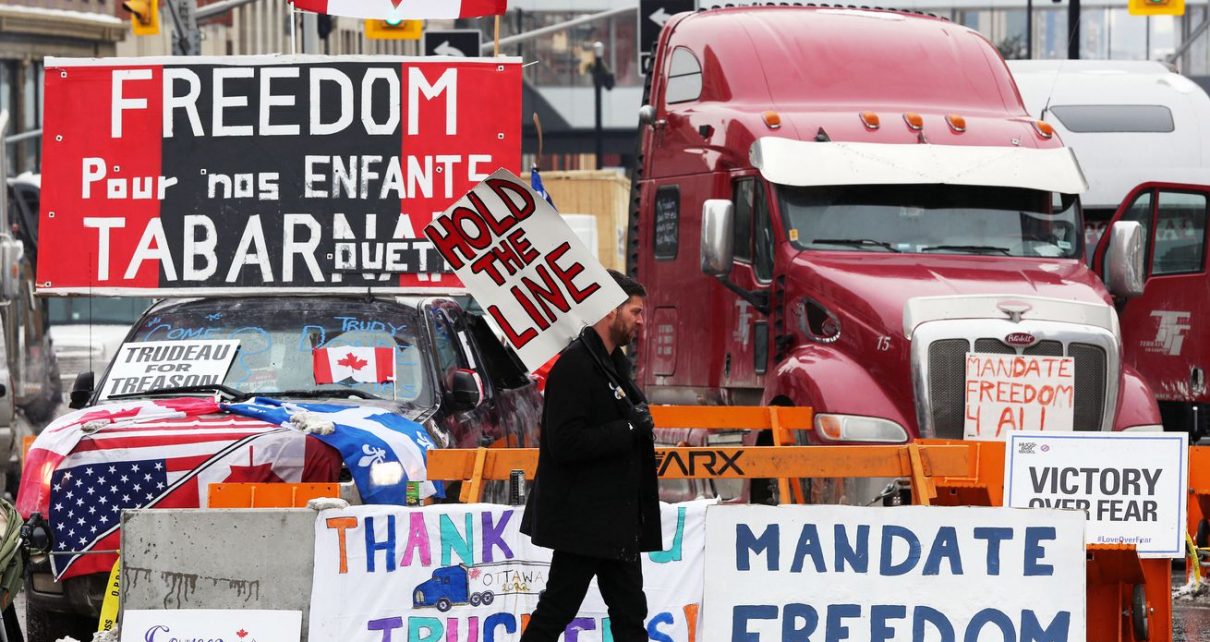
The “freedom convoy” that has besieged Ottawa isn’t a people’s revolt. It’s a fringe movement protesting its defeat.
Since January 28, Canada’s capital city of Ottawa has been under siege by a convoy of angry truckers — a two-week running protest that has drawn support from right-wing extremists in Canada and abroad.
The so-called “freedom convoy” is nominally protesting a vaccine mandate for truckers, implemented in mid-January on both sides of the US-Canada border. But the demonstrations have swiftly ballooned into a broader far-right movement, with some demonstrators waving Confederate and Nazi flags. Protester demands include an end to all Covid-19 restrictions in Canada and the resignation of Prime Minister Justin Trudeau.
The demonstrators, which have included as many as 8,000 people at their peak, have terrorized Ottawa: blockading streets, harassing citizens, forcing business closures, and honking their extremely loud horns all night. Ottawa police, who have proven some combination of unwilling and unable to restore order, have even set up a special hotline to deal with a deluge of alleged hate crimes stemming from the protests. In the first week of February, it received over 200 calls.
Ottawa Mayor Jim Watson has declared a state of emergency, and Trudeau’s government has deployed hundreds of Royal Canadian Mounted Police to the protests. As the situation in Ottawa continues, the freedom convoy movement has expanded across the country. Demonstrators have shut down at least two border crossings between Canada and the United States.
But while the protests are generating a lot of noise and attention, the eruption actually points up a counterintuitive fact: The Canadian far right is weak and ineffectual, especially when it comes to pandemic restrictions.
Canada’s provinces have generally employed strict Covid-19 measures such as school mask mandates and vaccine passports, including during the recent omicron surge. They have enjoyed broad public support in doing so; even the strictest restrictions are less controversial in Canada than in the US. The current demonstration is quite unpopular with the general public, divisive even inside the center-right Conservative party.
This doesn’t mean the movement will accomplish nothing. It has already contributed to a revolt against the Conservative party’s leader and is serving as an important organizing node for far-rightists. The border crossing blockage is putting more stress on the US-Canada supply chain, costing (by one estimation) $300 million a day in economic damage. Internationally, the freedom convoy has inspired copycat efforts in both the United States and France.
But it’s important to understand the broader context in Canada. News coverage of the convoy, especially from sympathetic anchors on Fox News, may lead Americans to believe that Canada is in the midst of a far-right popular uprising. In reality, the mainstream consensus in Canada about Covid-19, and the nation’s institutions in general, is holding. The so-called trucker movement is on the fringe, including among Canadian truckers — some 90 percent of whom are vaccinated.
They are angry because they have lost.
Canadians against “truckers”
I’ve been to Canada several times since the beginning of the pandemic, driving over the Peace Bridge from Buffalo into southern Ontario. The differences between the two countries become apparent almost immediately upon crossing the border. At gas stations and rest stops in upstate New York, masks are treated as optional at best; once you cross the border, virtually everyone you see indoors is masked up. When my daughter developed a fever from an ear infection, I was asked to provide a negative Covid-19 test upon entry to an urgent care facility; without one, we were told we would have been turned away.
My experiences reflect the country’s much stricter government policies. Vaccine passports, school mask mandates, and even bans on private indoor gatherings larger than 10 people have been widely used across Canadian provinces. Even Alberta, the prairie heart of Canadian conservatism, had imposed all three — with Jason Kenney, the province’s Conservative premier, arguing in September that a passport system was ”the only way to cut viral transmission without destroying businesses.”
Alberta and several other Canadian provinces are now in the process of lifting some of the more burdensome restrictions. But this generally reflects the omicron surge’s ebb rather a wave of public opposition; in Ontario, home to Ottawa and Toronto, the Conservative provincial government is following a preexisting reopening script pegged to a decline in case counts and hospitalizations. Some provincial leaders, like Quebec’s François Legault, noted that reopening plans were in no way influenced by trucker shenanigans.
There is a reason Canadian politicians have taken this stance: Poll after poll finds Canadians have widely supported restrictive pandemic policies at both the federal and provincial levels. This is not to say they enjoy restrictions on their freedoms — who does? — but simply that they believe the government has an obligation to act when case counts are high.
This is especially clear when it comes to coercive vaccination rules, ostensibly the freedom convoy’s main target.
The January edition of the Covid-19 Monitor, a regular survey of Canadian attitudes about the pandemic, finds that about three-quarters of Canadians support vaccine passports for indoor dining and gatherings. Strikingly, 70 percent would “strongly” or “somewhat” support a vaccine mandate for all eligible adults — a vastly more restrictive policy than any province has actually attempted. What’s more, the researchers behind Covid-19 Monitor find that, on most issues, “support has remained relatively stable” throughout the pandemic — strong evidence that this isn’t just a short-term blip caused by omicron.
It makes sense, then, that the trucker protest is widely unpopular.
/cdn.vox-cdn.com/uploads/chorus_asset/file/23233188/1238216196.jpeg) Dave Chan/AFP via Getty Images
Dave Chan/AFP via Getty ImagesThe polling firm Innovative Research Group has conducted three separate rounds of polling since the beginning of the convoy, and found that public opposition has risen as the protest has gone on. In their most recent survey, conducted February 4-9, a scant 29 percent of Canadians expressed support for “the idea of the protest” while 53 percent disapproved.
A separate survey by Léger, released on February 8, found that 62 percent of Canadians oppose “the message that the trucker convoy protests are conveying of no vaccine mandates and less public health measures.” Sixty-five percent of respondents agreed that the demonstrators represented a “small minority of Canadians who are thinking only about themselves.”
Why the trucker protest matters, even though they’re losing
It’s worth emphasizing that a movement does not have to be popular with a majority to have influence.
During the trucker protests, an uprising against Conservative Party Leader Erin O’Toole succeeded in toppling him from the top spot. The challenge was fueled, in part, by Conservative members of Parliament frustrated by O’Toole’s equivocal stance on the convoy, with many in the ranks calling on the party to embrace the truckers.
The leadership challenge points to the bigger effect of the protest: It is a rare action by the Canadian far right that’s gaining mainstream attention and backing. “Even if the trucker protests do recede, their show of strength has won them demonstrable support abroad, including financial support, and has established large communities online that could fuel future activity,” the New York Times’s Max Fisher writes.
The protests have had notable international reach, becoming a cause célèbre for anti-restriction conservatives in the US and Europe. Sixty-three percent of the donations to the truckers’ now-removed GoFundMe came from the United States; the American right reportedly played an important role in getting the protest off the ground. It’s also now inspiring actions elsewhere: An American convoy is scheduled to depart from California on March 4, with Washington as its ultimate destination. A similar French effort is already on its way to Paris, with police vowing to bar its entry to the capital.
Yet the fact that so much of the so-called trucker movement’s support seems to be coming from abroad is telling.
The reality is that a combination of factors, ranging from the structure of the Canadian political system to widespread acceptance of liberal cultural values, have made its government especially resistant to far-right radicalism. On issues ranging from Covid-19 to immigration to abortion, the mainstream consensus has held.
The freedom convoy’s willingness to disrupt life in Canada’s capital is less a sign of an incipient popular uprising than the lashing out of a minority that has little influence at the ballot box.




